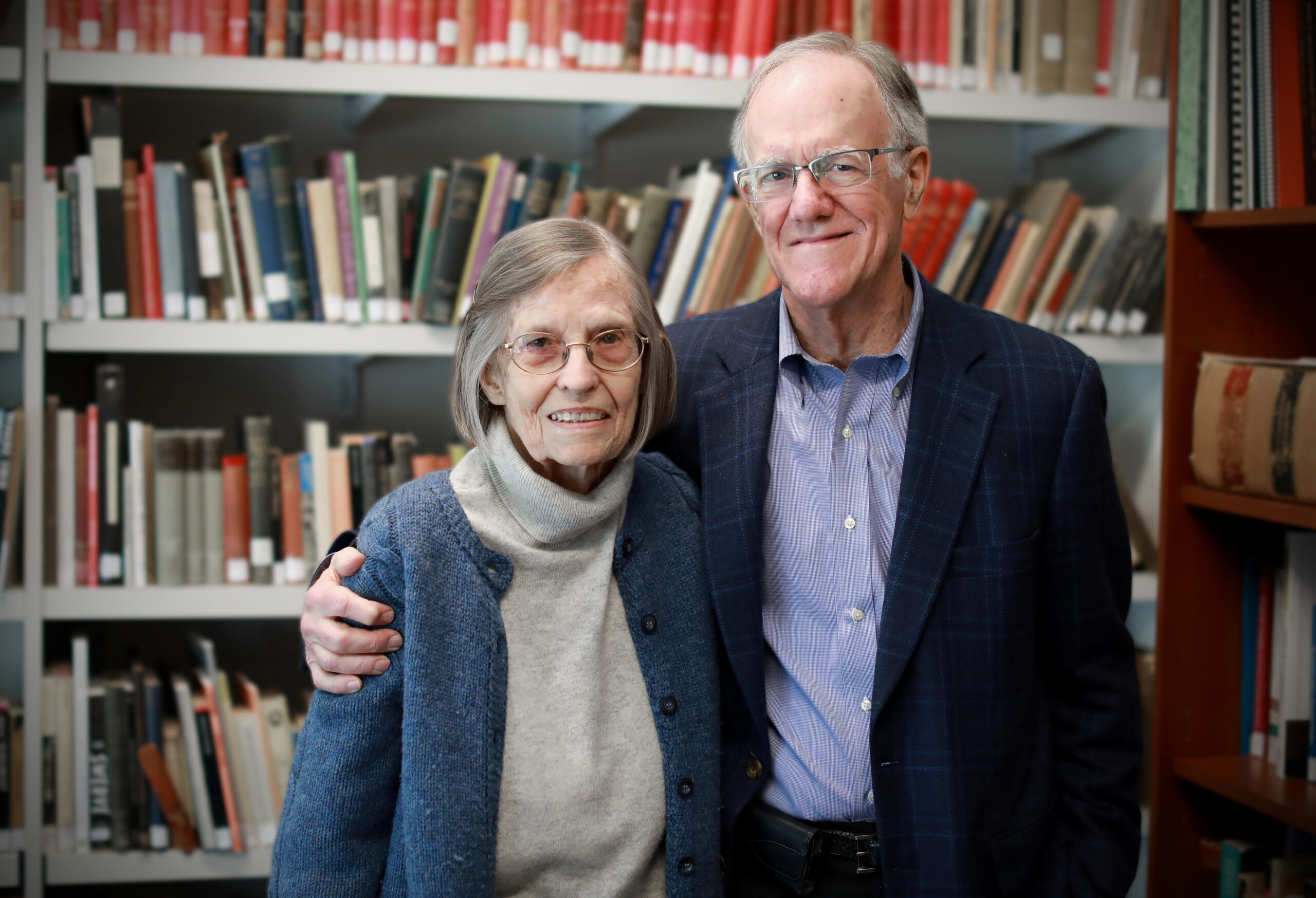
The Department of Classics in Arts & Sciences at Washington University in St. Louis has received an estate commitment from honorary emeritus trustee John H. Biggs, PhD ’83, and his late wife, classics scholar Penelope Biggs, PhD ’74, MA ’68, to name the John and Penelope Biggs Department of Classics.
“In an age when it feels like we’re always in a hurry, classicists treat their texts with great care,” said Feng Sheng Hu, the Richard G. Engelsmann Dean of Arts & Sciences and the Lucille P. Markey Distinguished Professor. “John and Penelope Biggs certainly read this way. Their love for classics inspires a sense of limitless curiosity, which they have generously sought to share so that others could read these works with the same passion.”
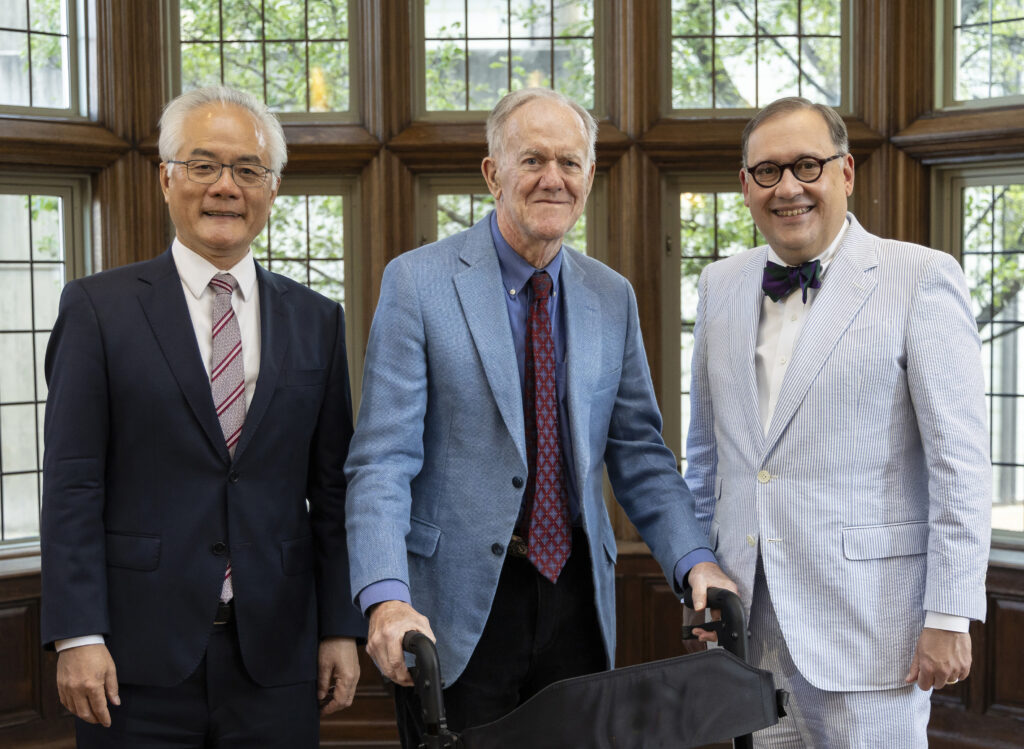
Department chair Tim Moore, the John and Penelope Biggs Distinguished Professor of Classics, noted that the couple have deep ties to WashU — as alumni, as benefactors and as regular participants in academic life.
“John and Penelope Biggs have been part of WashU classics for a generation,” Moore said. “They’ve always been present. They’ve done the readings and come to the lectures and participated in the discussions. This is an especially moving occasion because we’re saluting real friends and colleagues.”
The Biggs intend to make WashU a preeminent institution for the study of the ancient Mediterranean by expanding the John H. and Penelope Biggs Endowment Fund, which the couple established in 2015 to provide permanent support for the classics department. The couple’s latest intention builds on a series of previous gifts, dating back decades, that currently fund a variety of residencies, lectureships, scholarships and travel awards.
“It has been a tremendous privilege to support the Department of Classics over these past 40 years,” John Biggs said. “I look forward to our gifts providing more fully the resources that will allow the classics department to serve as the shining beacon for other classics departments — a beacon that I believe it already is.”
Henry Biggs, MBA ’04, LLM ’12, John and Penelope’s son, is a former associate dean in Arts & Sciences and current CEO and general counsel of Eusabian Technologies and Schedutrix. He said that, through their support, his parents long have hoped to make “the classics department at Washington University the model and even truly the envy of the country.”
“The gift today from our family is special also because it is given in part in appreciation of the joy received from the classics department,” Henry Biggs said. Of the department being named for his parents, he added: “We are incredibly honored and grateful.”
A critical moment
The study of classics can be traced practically to WashU’s founding. Sylvester Waterhouse, the university’s first professor of Greek, joined the faculty in 1859. In 1884, the Ladies Literary Society of Washington University drew national headlines for a Latin-language staging — one of the first in the United States — of the comedy “Rudens (The Rope)” by the Roman playwright Plautus.
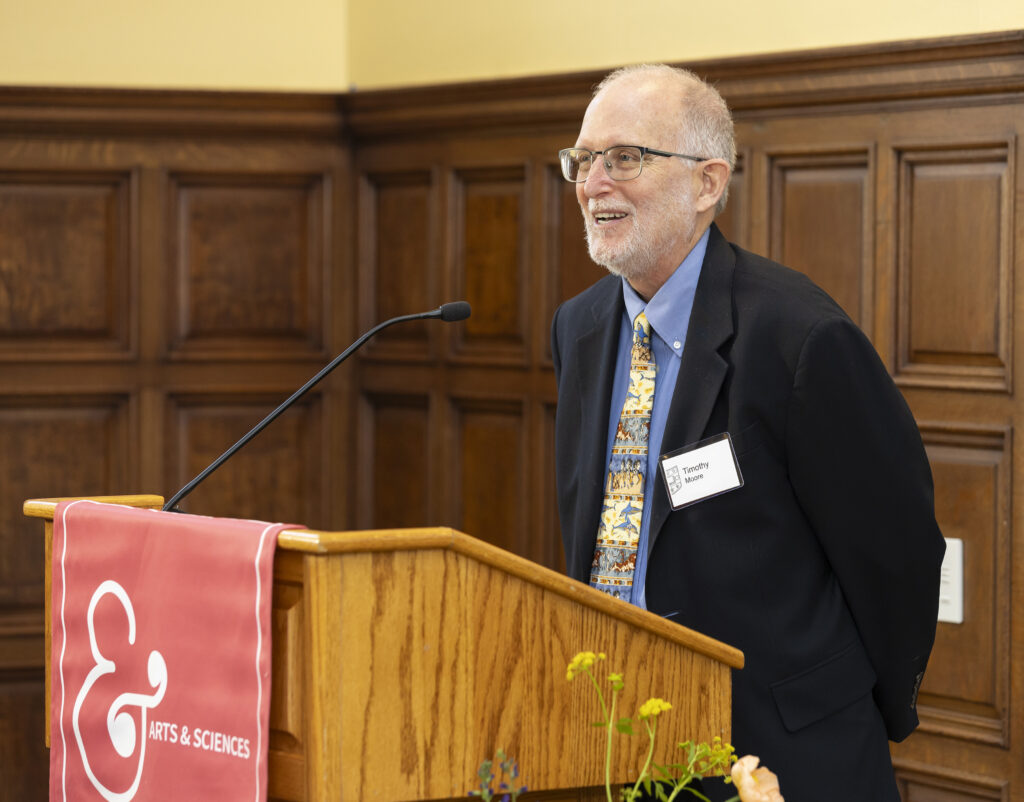
More recently, the Biggs Family Residency in Classics, which John and Penelope established in 1990, has played a key role in bringing many of the field’s most prominent scholars to campus. The couple also established the John and Penelope Biggs Distinguished Professorship in Classics, with Moore as inaugural recipient, in 2012.
“The creation of the Biggs Residency has proven particularly rewarding, allowing our family not only to get to know the most noteworthy classics professors but to actively participate in their talks,” John Biggs said. “Having the good fortune to attract Timothy Moore to Washington University through the gift of our endowed professorship — and to witness the wonderful work he has been able to do in developing the faculty as well as increasing student interest — has been outstanding.”
Moore said the new endowment gift comes at a critical moment for classics, both as a field and as a department.
“For a long time, classics thought of itself as the center of what was called the Western tradition,” Moore said. But in recent years, classics scholars have placed fresh emphasis on the multicultural nature of the Mediterranean and connections between classics and other world literatures. They’ve also sought to incorporate research and insights from a wide range of other humanities disciplines, including archaeology, history, literature and philosophy. “Today, the biggest question is, Where does classics fit? Where do we belong?”
In 2014, building on its nationally recognized Master of Arts, WashU’s classics department announced formation of a new doctoral program and welcomed its first cohort the next year. The program is notable for its openness to interdisciplinary study and for its specialized tracks in ancient performance, ancient history, ancient philosophy and Greek and Roman music. Candidates also have access to WashU’s significant collections of ancient coins and papyri, among other resources.
Following the death of Penelope Biggs, in 2022, John Biggs honored her legacy by establishing and endowing the Penelope Biggs Travel Award, which supports faculty and student travel relating to Greco-Roman antiquity. In its first year, the fund has provided over 18 awards. He also established an endowment that funds the Penelope Biggs Fellowship for students pursuing a master’s degree or doctorate in classics and the Penelope Biggs Scholarship for undergraduate students studying classics.
In April, the department welcomed hundreds of scholars to St. Louis for the 120th annual meeting of the Classical Association of the Middle West and South. Fifteen WashU faculty and students presented papers or conducted workshops. John Biggs received the organization’s service award.
About John and Penelope Biggs
Born and raised in Kirkwood, Mo., John Biggs began studying Greek as a student at the Thomas Jefferson School, racing with friends to see who could translate the most lines in a given time period. As a Harvard University undergraduate, he studied Pindar with renowned classicist John H. Finley Jr. and performed in a Greek-language production of Sophocles’ Oedipus at Colonus.
John met Penelope, his wife of 63 years, thanks to a Latin class. Standing in a department hallway at Harvard, trying to decide between two courses, he spotted Penelope, a Boston native and Radcliffe College classics major, chatting with famed scholar Cedric Whitman about the latter’s seminar on the Roman poet Catullus. “OK,” John thought, recounting the story to Washington University magazine. “That’s decisive.”
While at Radcliffe, Penelope wrote what became a widely cited paper, published in Classical Philology, on the disease theme in Sophocles. She also nurtured a particular fondness for Cicero. “I loved unraveling those long, winding sentences,” she told WashU magazine, “and then pulling them back together again.”
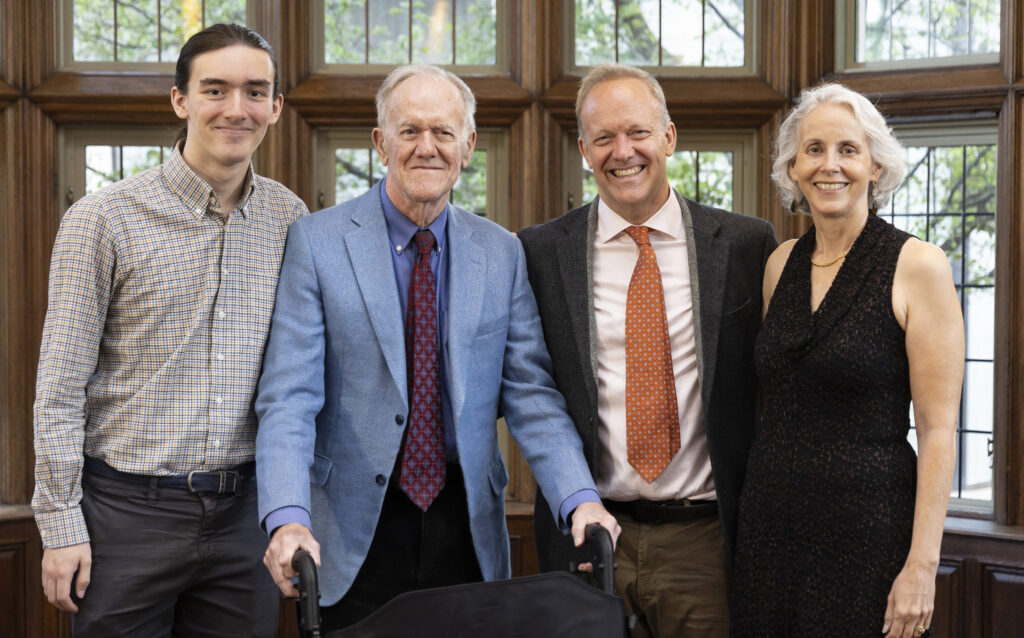
After graduation — John in 1958, Penelope in 1959 — the couple married and settled in St. Louis. John ascended the ranks at General American Life Insurance Co. Penelope, enrolling at WashU, earned her master’s in classics in 1968 and her doctorate in comparative literature in 1974. She then joined nearby Lindenwood College (now university) as an assistant professor and later taught Latin at Mary Institute (now Mary Institute-Country Day School). She also helped found the New City School in St. Louis’ Central West End.
John, meanwhile, came to Washington University in 1977 as vice chancellor for finance and administration. He earned a doctorate in economics from WashU in 1983, fulfilling his language requirement by translating passages from “The Iliad” with classics professor Mary Merritt Sale. He also taught economics classes and later served as president and chief executive officer of Centerre Trust Inc. and as chief executive officer for TIAA-CREF. He retired in 2002.
A WashU trustee since 1985, John received the Arts & Sciences Dean’s Medal in 2005. In 2009, John and Penelope received the Robert S. Brookings Award and, in 2011, John received an honorary doctor of humane letters degree from the university. John currently serves on the Arts & Sciences National Council and as an honorary member of the New York City Regional Cabinet.
In addition to their support for the classics department, the couple established the John H. Biggs Distinguished Professorship in Economics in 2022, which is currently held by George-Levi Gayle.
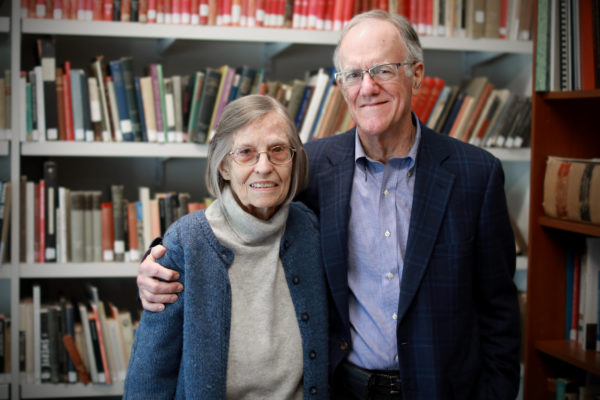
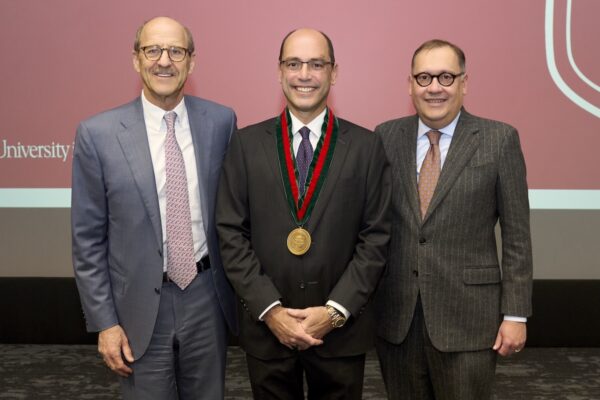
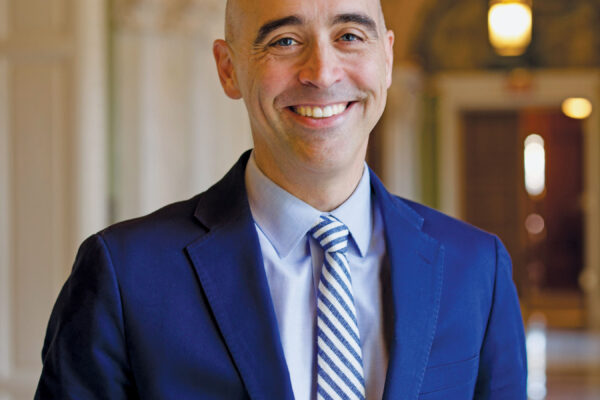
Comments and respectful dialogue are encouraged, but content will be moderated. Please, no personal attacks, obscenity or profanity, selling of commercial products, or endorsements of political candidates or positions. We reserve the right to remove any inappropriate comments. We also cannot address individual medical concerns or provide medical advice in this forum.